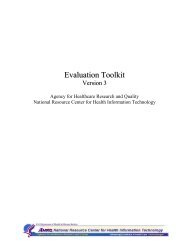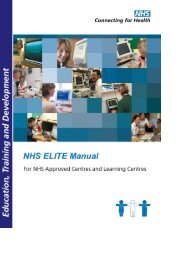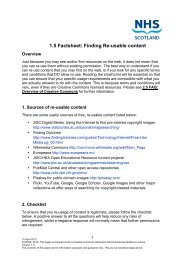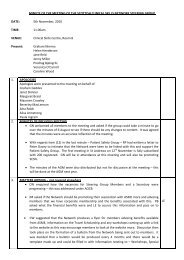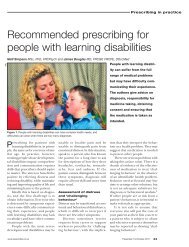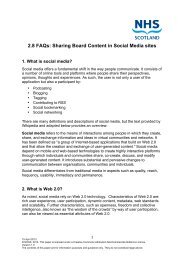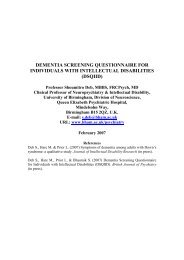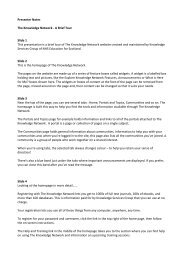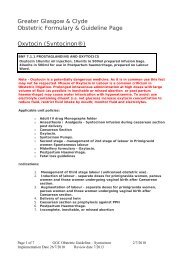The Fife Dementia Strategy: 2010 â 2020 - The Knowledge Network
The Fife Dementia Strategy: 2010 â 2020 - The Knowledge Network
The Fife Dementia Strategy: 2010 â 2020 - The Knowledge Network
Create successful ePaper yourself
Turn your PDF publications into a flip-book with our unique Google optimized e-Paper software.
4.11 Hospital & Acute Care<br />
AIM<br />
People with dementia who have medical needs requiring hospital care<br />
are cared for in a suitable environment by well trained staff that are<br />
skilled in working with people with complex needs such as those of<br />
someone with dementia. Support will be available from a multidisciplinary<br />
Old Age Psychiatry Liaison Service, and all patients are given an appropriate<br />
assessment which leads to a care pathway suited to their needs.<br />
RECOMMENDATIONS TO ACHIEVE THIS<br />
4.11.1 Hospitals and clinical staff work to implement changes to the<br />
environment and care practices which have been shown to improve the<br />
experience of people with confusion in the hospital.<br />
While in Accident & Emergency and acute care people with dementia are<br />
exposed to an increased number of stimuli and an unfamiliar environment,<br />
often all at once. <strong>The</strong>se environments are busy and noisy with the constant<br />
sounds of people talking, telephones ringing, alarms going off, doors opening,<br />
and various individuals asking questions and performing care tasks. For<br />
patients with dementia the exposure to these stimuli and the change in routine<br />
can result in the patient experiencing significant distress. This distress may be<br />
communicated through behaviours that are seen as disruptive or challenging<br />
for care staff.<br />
As highlighted in recent guidance issued by the Scottish Government 67 , a<br />
number of practices can improve the experience of people with dementia in<br />
the hospital including: ensuring all older people with apparent confusion are<br />
given an appropriate psychological and physical assessment, ensuring each<br />
person is introduced upon each entry, providing simple explanations of what<br />
they are doing and why, minimising the number of staff carrying out a<br />
procedure, minimising the number of bed moves made, and appointing a key<br />
staff member to work with the individual with dementia whenever possible.<br />
Staff are often faced with additional tasks when caring for someone with<br />
dementia as not only must they respond to the person’s physical care needs,<br />
but must also become involved in the management of the individuals<br />
psychological needs including behaviours such as walking and vocalisation.<br />
<strong>The</strong>se behaviours impact on the nurses, the outcomes for the person with<br />
dementia, and they also frequently impact on the care and outcomes of others<br />
within the hospital environment 68 . All staff working and interacting with<br />
patients in the hospital will receive dementia awareness training, with those<br />
67 Scottish Government (2009). Recognising the Needs of People with <strong>Dementia</strong> in NHS<br />
Accident and Emergency Departments: Supporting guidance. Edinburgh.<br />
68 Moyle W, Olorenshaw R, Wallis M & Borbasi S (2002). Best practice for the management of<br />
older people with dementia in the acute care setting: a review of the literature. International<br />
Journal of Older People Nursing. 3: 121-130.<br />
77




